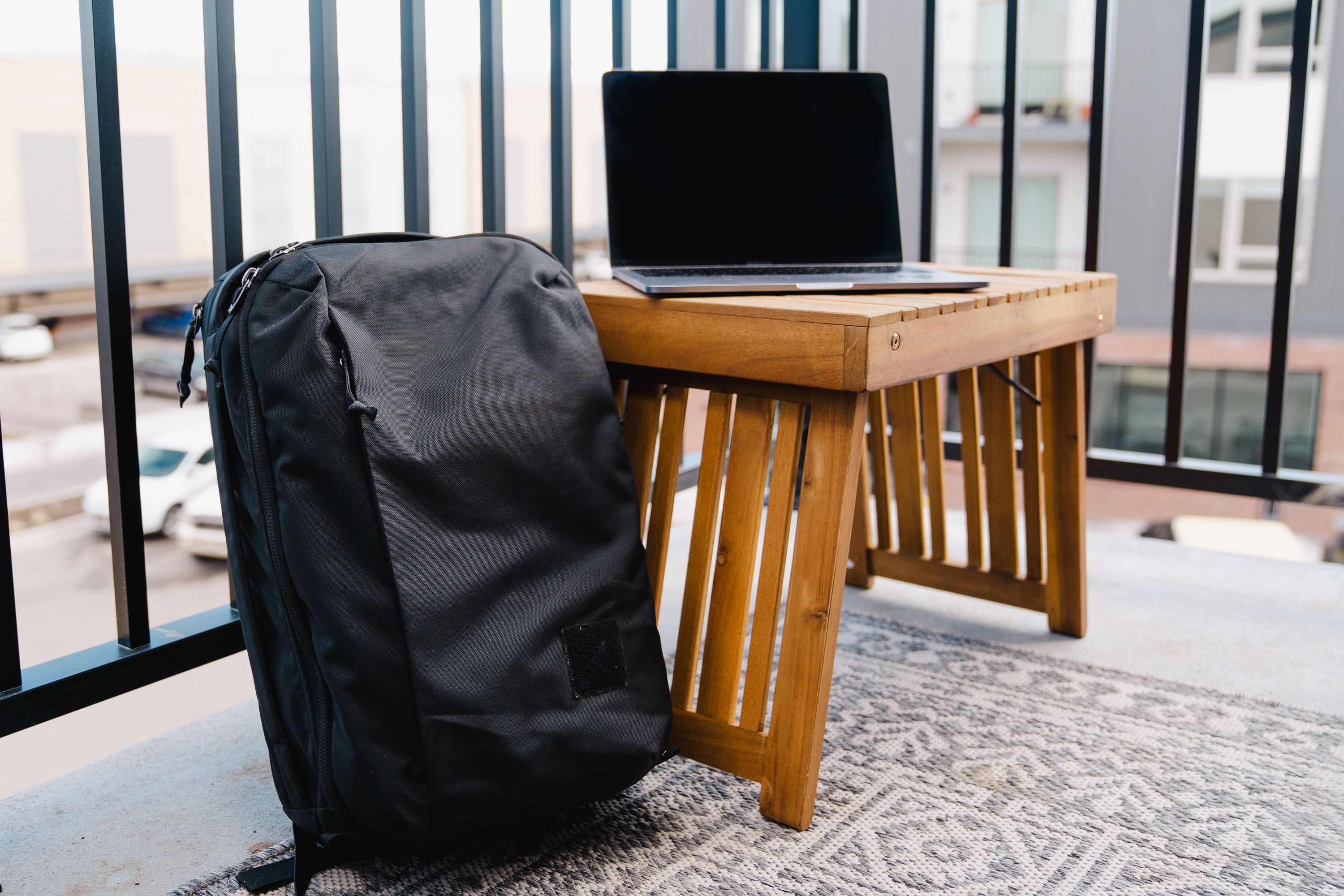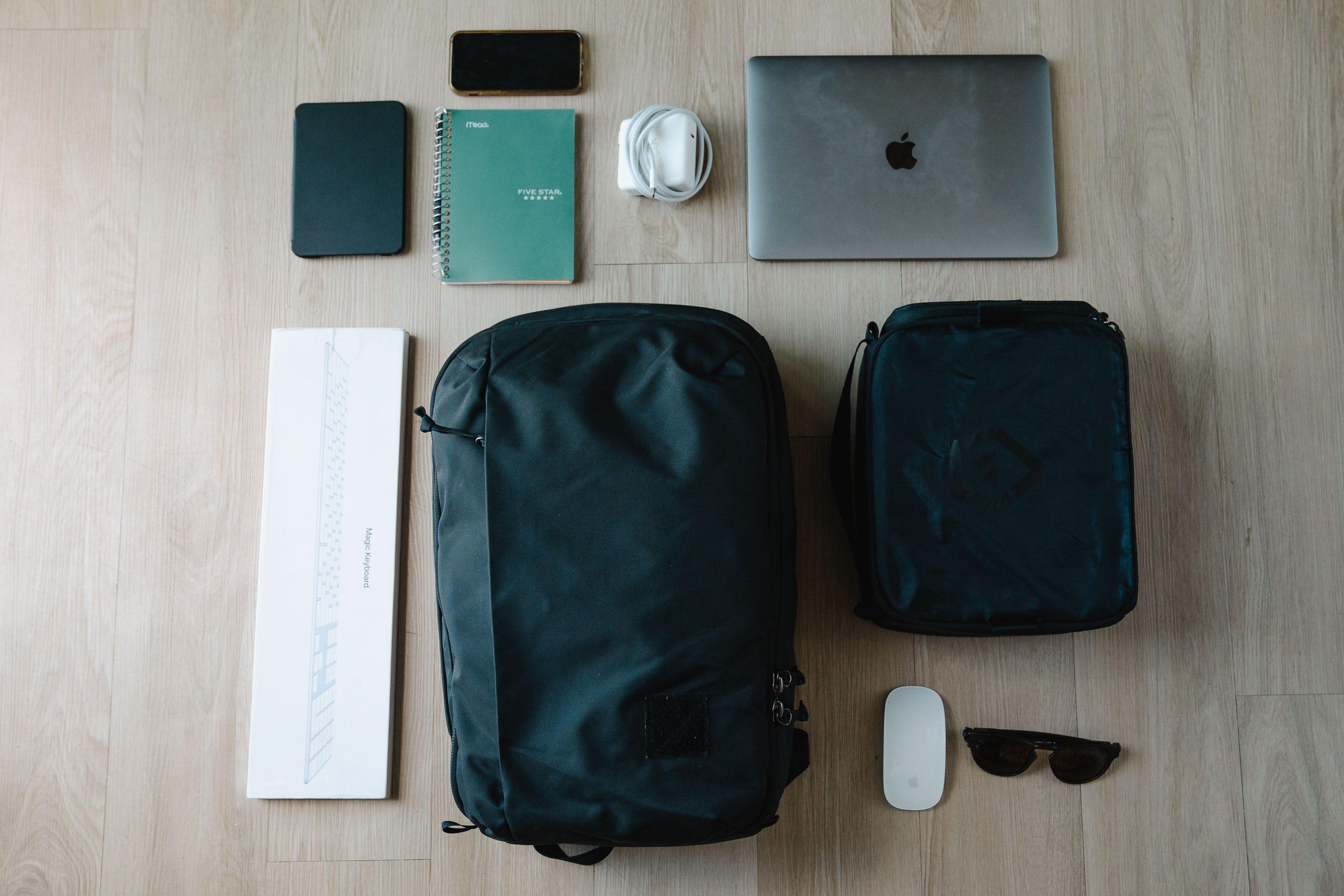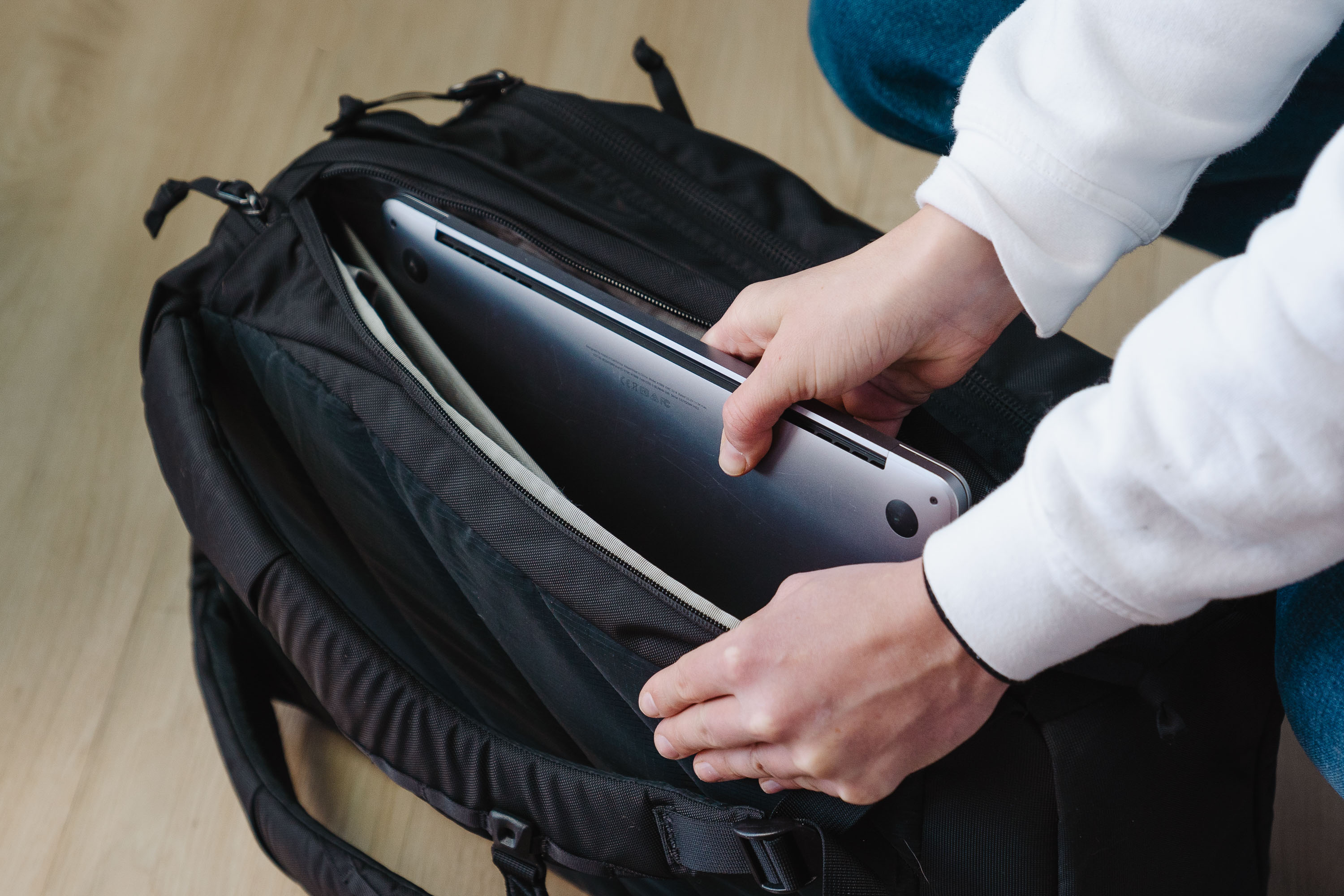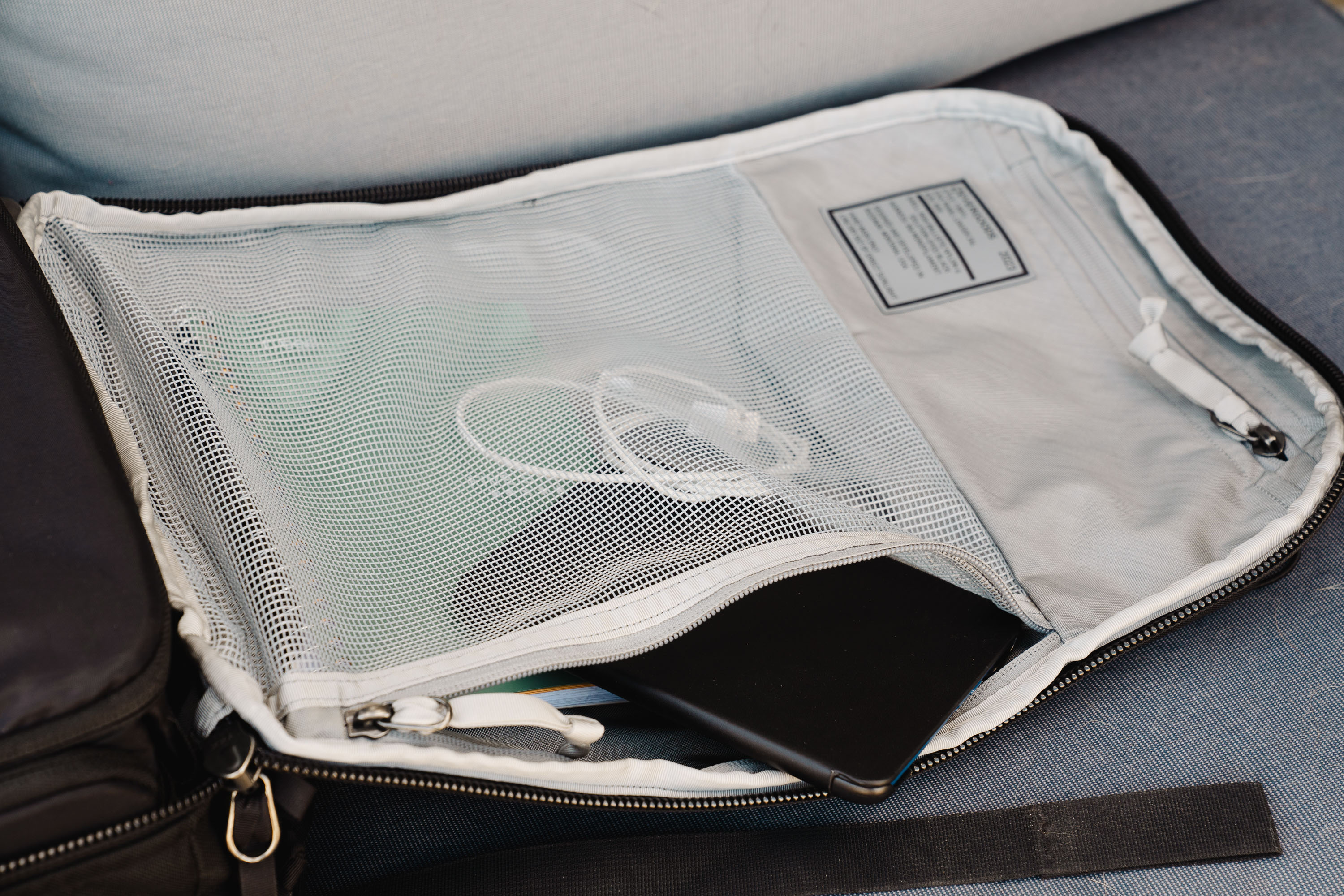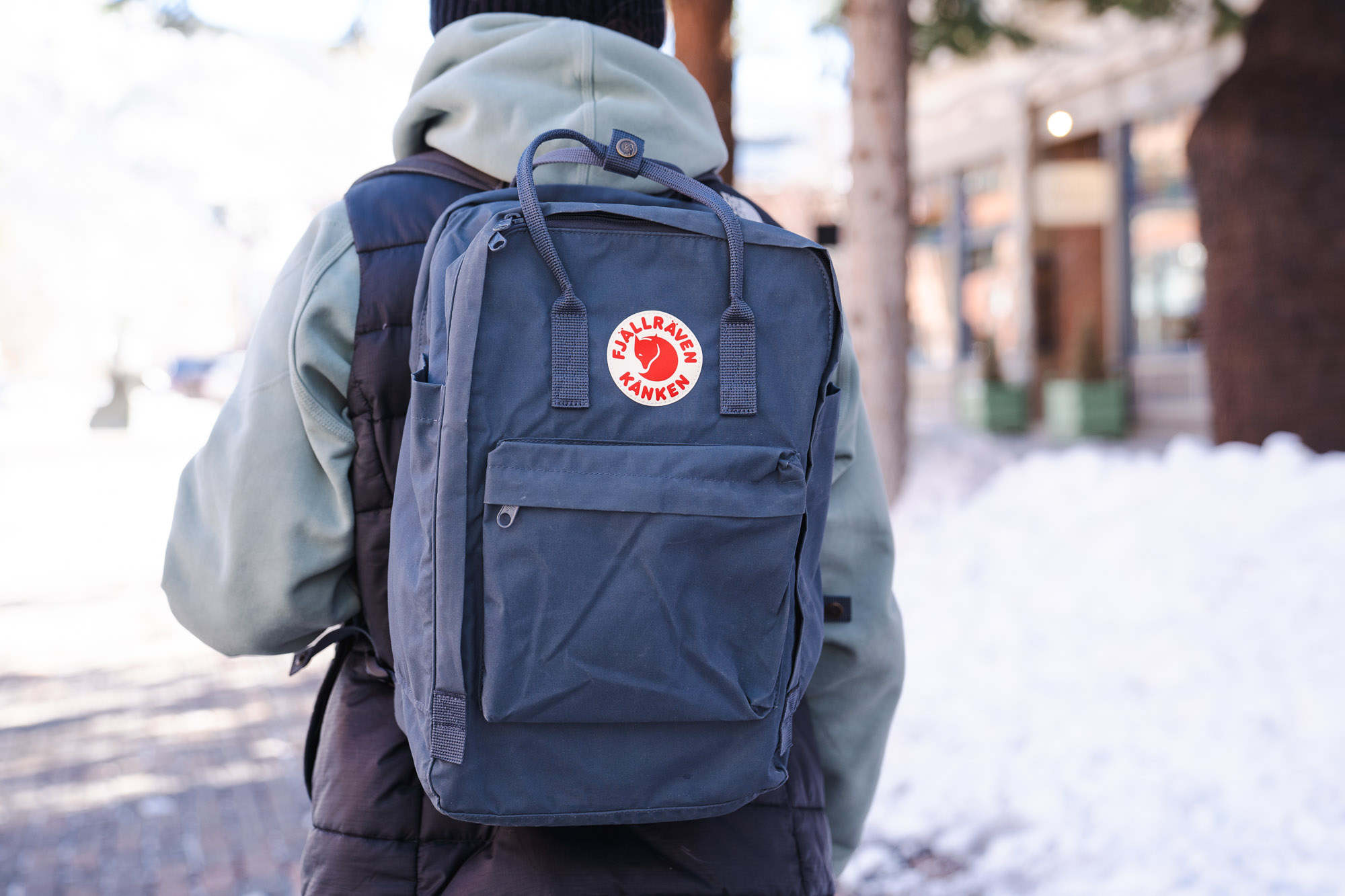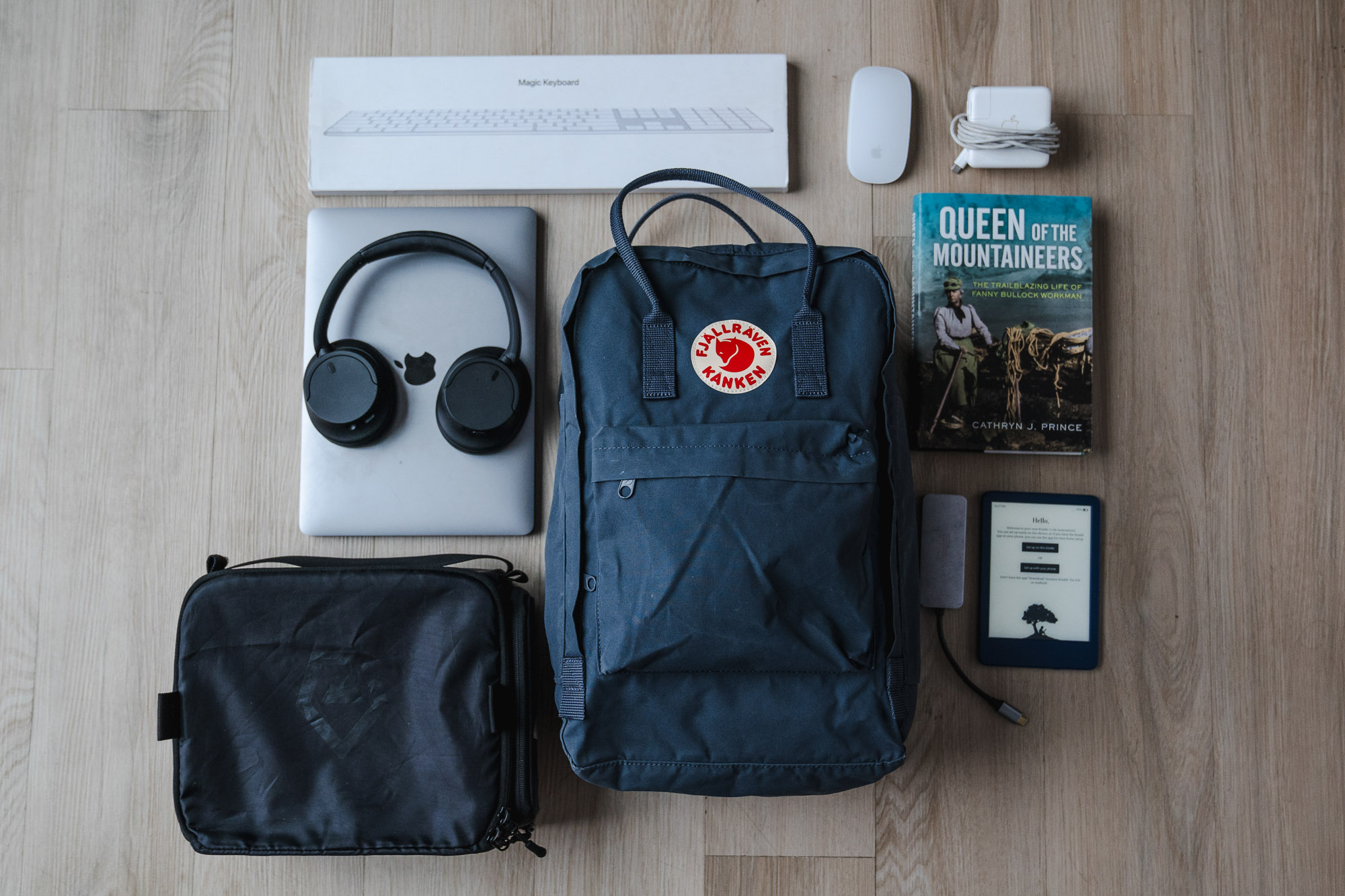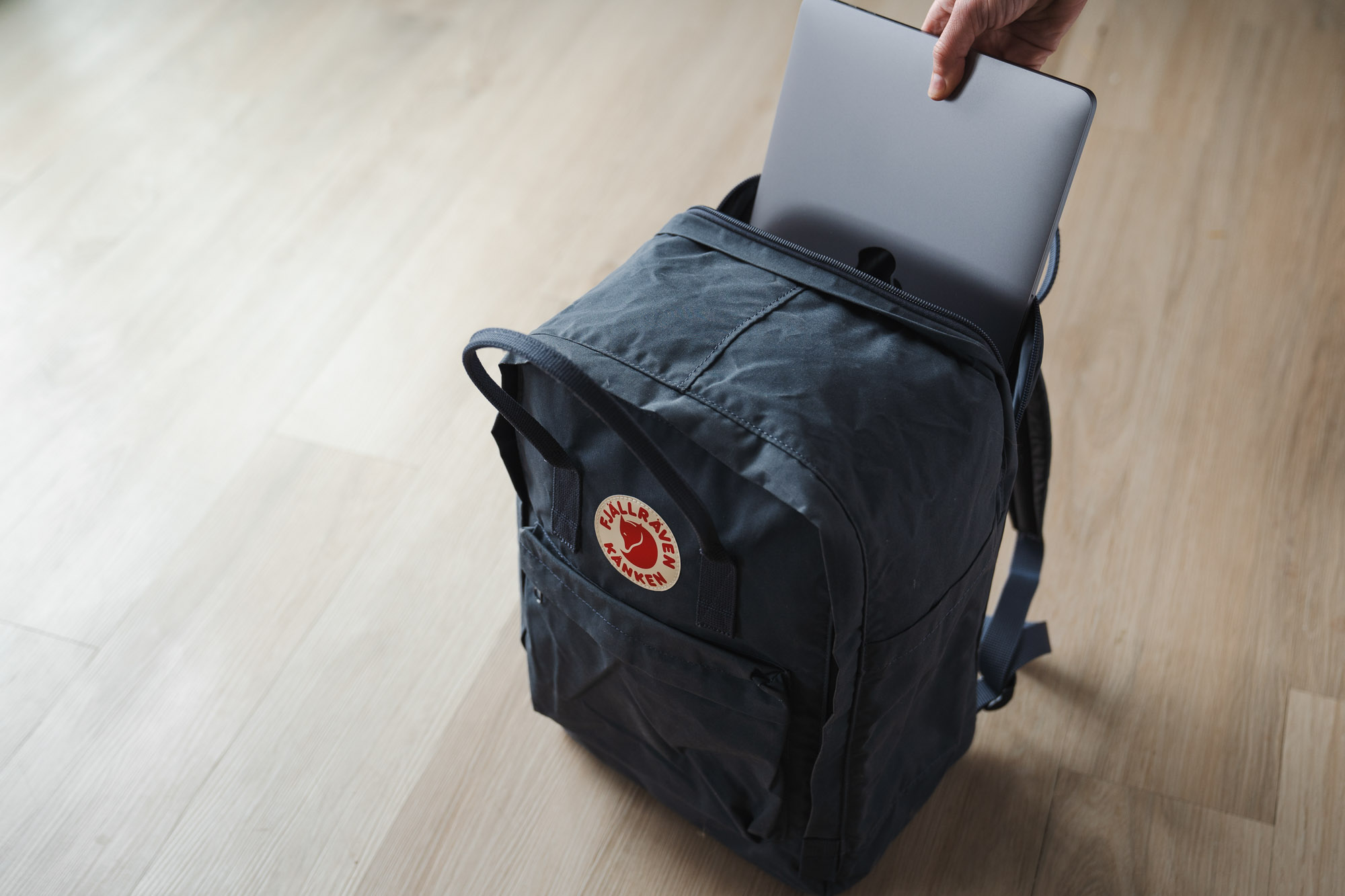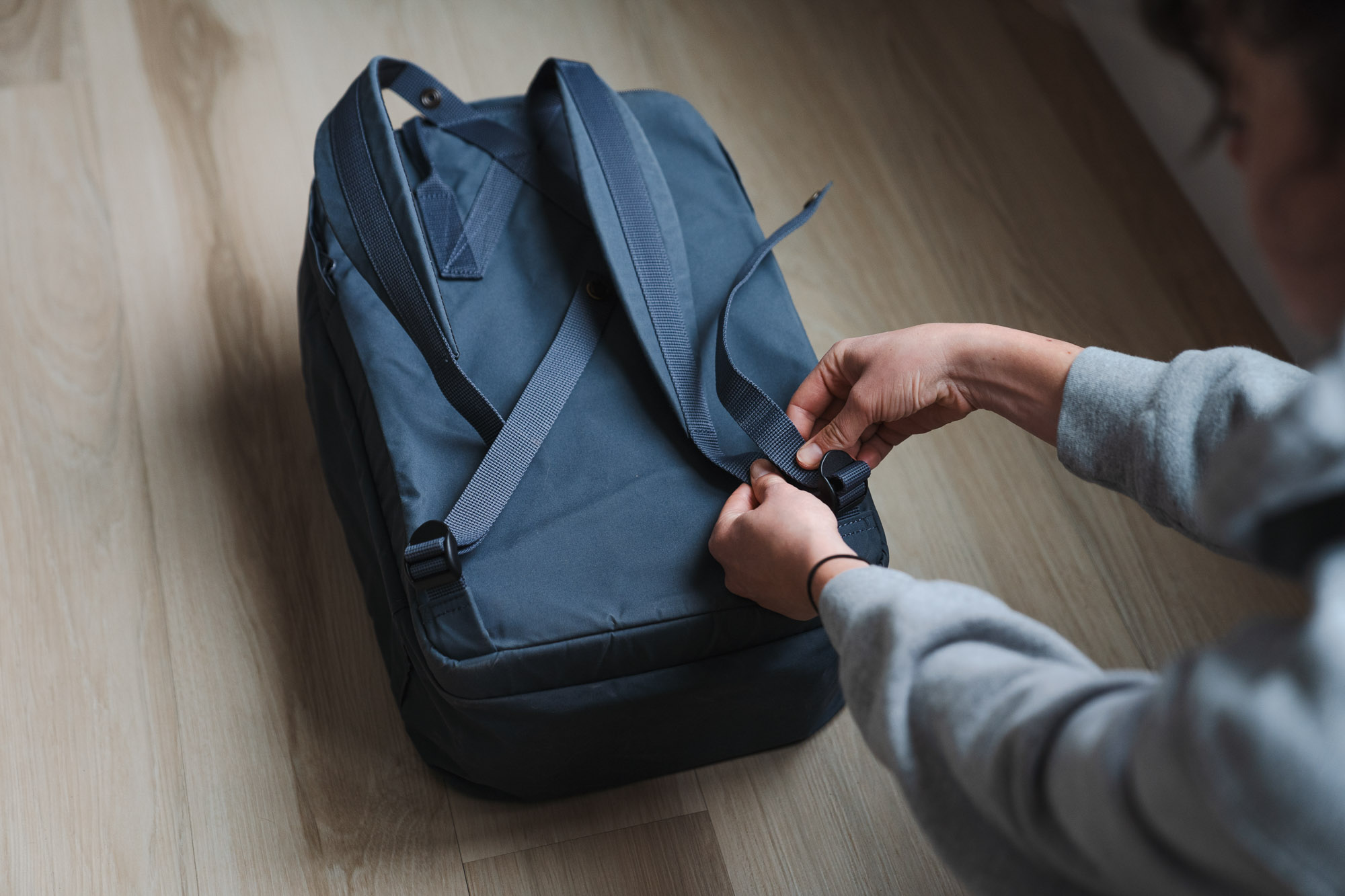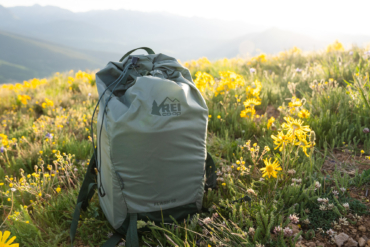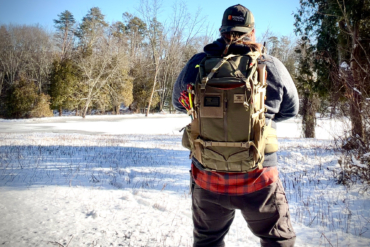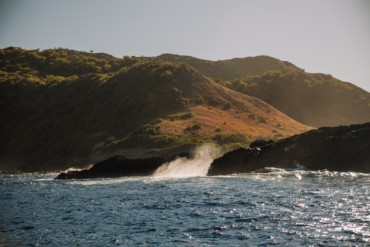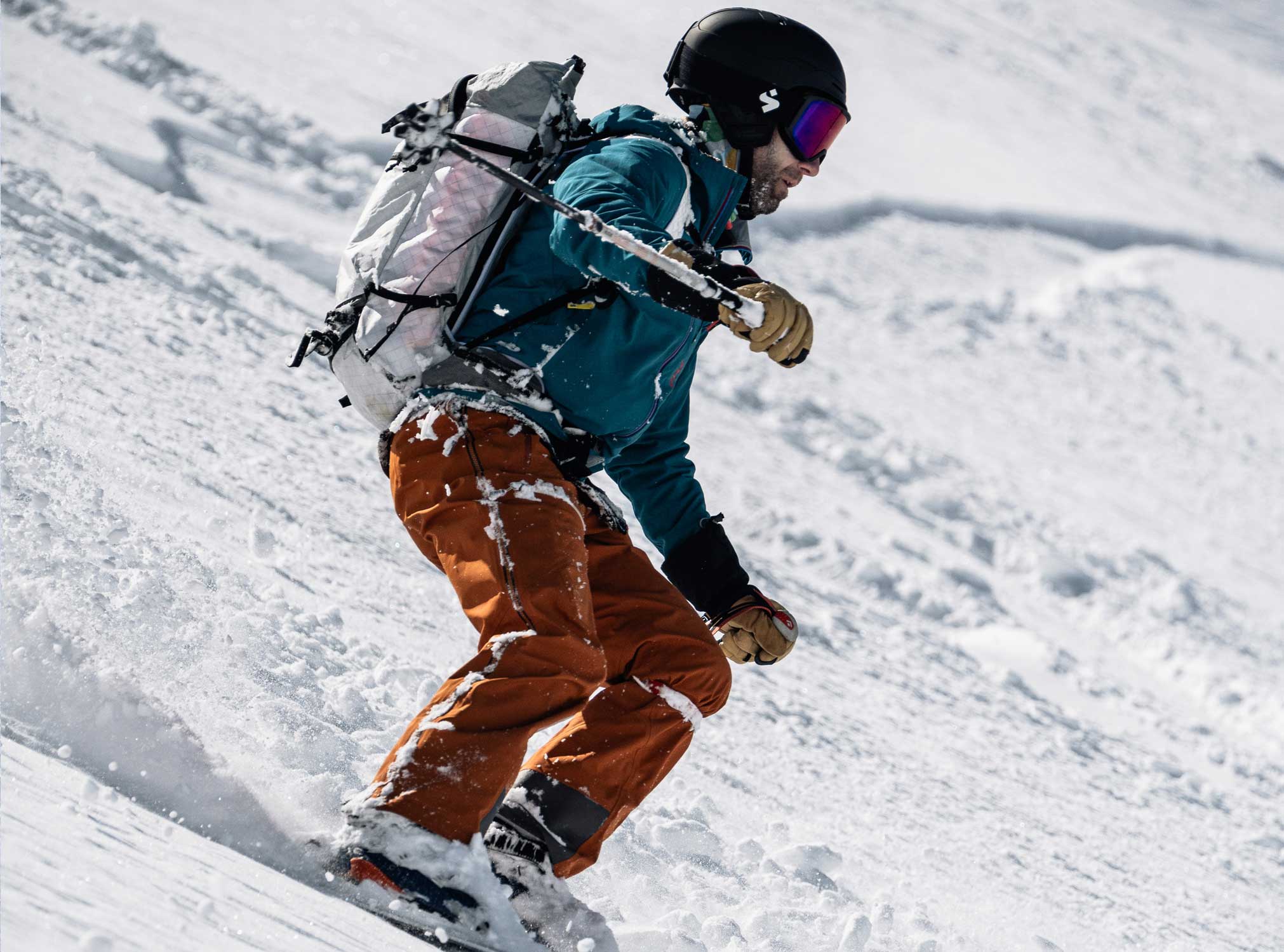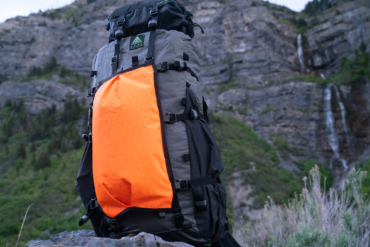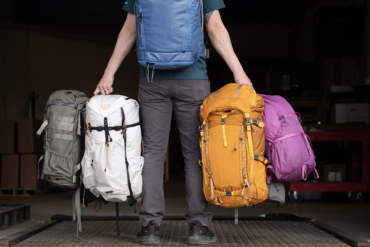Now that we live in a post-pandemic world, it seems that everyone is returning to their selective workplace, school, or airport with a backpack in hand. Laptop backpacks come in an array of styles, sizes, and overall intended uses, so we thought it was time to take a deep dive into what the best ones are and what attributes make them that way.
Our testers rounded up what we think are the best 10 laptop backpacks on the market right now and used them in airports, offices, and coffee shops across America. To truly assess these backpacks’ abilities to, well, do their job, lead tester Meghan put them through a months-long, rigorous testing process where she examined their protective qualities, overall comfort, and intended uses. This came with its own unplanned series of accidental drops, liquid spills, and snowy trudges to and from her favorite workplaces.
Of course, there isn’t one perfect laptop backpack for everyone, but this guide will be a sure-fire way for you to narrow down what you are searching for in terms of style, padding, and other specifics. At the end of our selection, you’ll find our helpful Comparison Chart, Buyer’s Guide, and Price & Value sections.
Editor’s Note: We updated our laptop backpack guide on April 23, 2025, adding our new budget pick, the Dakine Campus Backpack 25L, and the Osprey Arcane Tote Pack, a unique backpack/tote combo.
The Best Laptop Backpacks of 2024
Evergoods Civic Panel Loader 24L
- Dimensions: 18" x 7" x 11.5 "
- Weight: 3 lbs., 1.6 oz.
- Capacity: 24L
- Laptop compartment size: 17"
- Best use: Everyday and travel
Pros
- Functions as both a laptop backpack and suitcase
- Well-structured and protected
- Full panel loading access
Cons
- Limited color schemes
- Expensive
Dakine Campus Backpack 25L
- Weight: 1.5 lbs
- Capacity: 25L
- Laptop compartment size: 15 in.
- Best use: School and daily commutes
Pros
- Affordable price
- Roomy compartments with plenty of organization features
- Includes an insulated pocket for cold food items
Cons
- Laptop sleeve lacks a closure latch or zipper
- Larger back panel may not be suitable for petite users
- Contains PFAs and cannot be shipped to certain states or regions
TimBuk2 Authority Laptop Backpack Deluxe
- Dimensions: 18.9 x 11 x 5.3 in.
- Weight: 2 lbs., 6.4 oz.
- Capacity: 20L
- Laptop compartment size: 17 in.
- Best use: Everyday and travel
Pros
- Plenty of secure pockets
- Generous padding keeps laptop and shoulders protected
- Streamlined, modern design
Cons
- Front zippered pocket is harder to open
- Water bottle pocket is narrow
- Limited colorways
Fjällräven Kånken 17″ Laptop Pack
- Capacity: 20 liters
- Weight: 1 lb., 1.6 oz.
- Dimensions: 16.5” x 11.8” x 7”
- Compartment access: Zippered top access
- Material: Vinylon F material on exterior, 70D polyamide lining
- Electronic storage: 17” padded laptop sleeve
Pros
- Cube design more conducive to storage
- Extra foam insert doubles as a seat pad
- Stylish and carry-on compliant
Cons
- Side pockets are not stretchy enough for larger bottles
- Only two zipper pockets
- Fabric is easily creased
Tortuga Travel Daypack Pro
- Dimensions: 17.3 x 11.6 x 6.5 in
- Weight: 1 lb.
- Capacity: 21L
- Laptop compartment size: 16 in.
- Best use: Jet-setting work trips, and as a personal item with electronics protection
Pros
- Dialed in as a personal item while traveling
- Large laptop sleeve accommodates modern computers
- Soft structure can be packed away in a larger bag while traveling
- High-quality exterior and interior materials
Cons
- Bag can be a bit floppy when under filled
- Zippers are slightly tough to pull one-handed
Patagonia Refugio Daypack 30L
- Dimensions: 19 x 12 x 6.5 in.
- Weight: 1 lb., 12 oz.
- Capacity: 30L
- Laptop compartment size: 15 in.
- Best use: Hiking
Pros
- Generous storage space
- Removable laptop sleeve/desk caddy compartment
- Hydration hanger and pass-through access
Cons
- Lacks structure
- May not be a professional enough aesthetic for the office
Mystery Ranch 3 Way 27 Briefcase
- Dimensions: 12 x 17.5 x 11.5 in.
- Weight: 3 lbs., 1.6 oz.
- Capacity: 27L
- Laptop compartment size: 17 in.
- Best use: Office and travel
Pros
- 3 different modes of carry
- Protective laptop padding
- Plenty of storage space
Cons
- Shoulder carry strap lacks any padding
- Strap buckles challenging to open and close
- Bulky design
Topo Designs Daypack Tech
- Dimensions: 11 x 19 x 5 in.
- Weight: 1 lb., 9.6 oz.
- Capacity: 21L
- Laptop compartment size: 15 in.
- Best use: Travel and daily use
Pros
- Well-padded external laptop compartment
- Simple design with durable materials
- Neon inside liner makes it easy to find gear or supplies
Cons
- Lack of internal organization
- Less pockets than other options
- Dimensions: 19.2 x 13.3 x 11 in.
- Weight: 1 lb., 9.6 oz.
- Capacity: 28L
- Laptop compartment size: 16 in.
- Best use: School, travel, outdoor
Pros
- 28 liters provides generous storage space
- Multi-compartment and several pockets provide organization
- Lightweight frame and materials
Cons
- Would benefit from a open front panel loading system
- Zippers prone to grabbing
- Slightly cumbersome design
- Dimensions: 18.1” x 15” x 9.1”
- Weight: 1.77 lbs
- Capacity: 21L
- Laptop compartment size: 16”
- Best use: Travel
Pros
- Two different modes of carry provides versatility
- Sleek aesthetic functions well in professional and travel-oriented environments
- Laptop sleeve has ample padding on front and back
Cons
- Lacks a water bottle sleeve
- Hidden exterior pocket zipper can be hard to reach from above
- Tote straps would benefit from padded handles
- Dimensions: 12.5 x 9 x 21 in.
- Weight: 2 lbs., 2.4 oz.
- Capacity: 40L
- Laptop compartment size: 17 in.
- Best use: School and travel
Pros
- 40L provides plenty of storage space
- Over 5 different pockets that can be used for organization
- Microfiber lining protects screens and glasses against scratches
Cons
- Some pockets open from the bottom, making objects prone to falling out
- Main shoulder straps attach to the backpack with weaker stitching and materials
- Not ideal for folks with petite frames or shorter torsos
- Dimensions: 17.5 x 7.25 x 12 in.
- Weight: N/A
- Capacity: 27L
- Laptop compartment size: 15 in.
- Best use: Travel
Pros
- Minimalist design with plenty of storage space
- Attaches to luggage handle for easy travel
- Separate zippered laptop compartment
Cons
- Protective foam not thick
- Water bottle side pocket does not fit larger bottles
- Top storage panel only secures down via small magnets
- Dimensions: 17.7 x 10.6 x 6.7 in.
- Weight: 1 lb., 8 oz.
- Capacity: 13L
- Laptop compartment size: 14 in.
- Best use: Short commutes, crowded bus rides
Pros
- Compact silhouette is barely noticeable on your back
- Impressive organization in a 13L bag
- Available in both Cordura nylon or X-Pac
- Stealth pocket behind the back panel
- Light interior color aids in finding small goods
Cons
- Laptop sleeve only fits computers up to 14"
- Bit pricey for such a small bag

Laptop Backpacks Comparison Chart
| Laptop Backpack | Price | Weight | Capacity | Laptop Compartment | Best Use |
|---|---|---|---|---|---|
| Evergoods Civic Panel Loader 24L | $279 | 3 lbs., 1.6 oz. | 24L | 17 in. | Everyday and travel |
| Dakine Campus Backpack 25L | $49 | 1.5 lbs | 25L | 15 in. | Office, non-commuter environments |
| TimBuk2 Authority Laptop Backpack Deluxe | $159 | 2 lbs., 6.4 oz. | 20L | 17 in. | School and daily commutes |
| Fjällräven Kånken 17″ Laptop Pack | $125 | 1 lb., 1.6 oz. | 20L | 17 in. | School and travel |
| Tortuga Travel Daypack Pro | $125 | 1 lb. | 21L | 16 in. | Travel, personal item |
| Patagonia Refugio Daypack 30L | $129 | 1 lb., 12 oz. | 30L | 15 in. | Hiking |
| Mystery Ranch 3 Way 27 Briefcase | $229 | 3 lbs., 1.6 oz. | 27L | 17 in. | Office and travel |
| Topo Designs Daypack Tech | $129 | 1 lb., 9.6 oz. | 21L | 15 in. | Travel and daily use |
| Osprey Ozone Laptop Backpack | $170 | 1 lb., 9.6 oz. | 28L | 16 in. | School, travel, outdoor |
| Osprey Arcane Tote Pack | $125 | 1.77 lbs | 21L | 16 in. | Travel |
| The North Face Router Backpack | $159 | 2 lbs., 2.4 oz. | 40L | 17 in. | School and travel |
| Everlane ReNew Transit Backpack | $95 | N/A | 27L | 15 in. | Travel |
| Able Carry Thirteen Daybag | $149 | 1 lb., 8 oz. | 13L | 14 in. | Short commutes, crowded bus rides |

How We Tested Laptop Backpacks
Our Expert Tester
Stock full of writers who frequent local coffee shops, office spaces, and outdoor vistas, GearJunkie understands the importance of finding that ideal laptop backpack that can provide space, back support, and technology protection. We’ve rounded up what we think are the leading EDC, or “everyday carry”, backpacks of the industry. As new products hit the market or catch our eye, we will continue to test and update this guide.
As a full-time graphic designer, freelance photographer, and writer, lead tester Meghan LaHatte is no stranger to the world of laptop backpacks. Due to her work at a local newspaper and for GearJunkie, she is constantly on the move between her home desk, office in Aspen, and local coffee shops. Meghan certainly did not take the genesis of this buyer’s guide lightly as she put each of these backpacks through the wringer for testing.
Our Testing Process
The most important aspect of these laptop backpacks we tested was their protection factor and durability. When carefully examining each pack, our lead tester noted how thick the padding was where a computer was meant to be stored. Was it less than an inch, thicker than an inch, or somewhere in between? She also examined the materials in which the padding was made — typically foam, plastic, or a combination of the two. After noting the quality of the padding, Meghan literally threw the backpacks. Yep, you read that right.
To trigger what would be an “oopsy” moment like accidentally nudging the backpack off a desk or an unideal strap failure, she placed an old, non-functioning laptop in each backpack before tossing it across her apartment. (She would like to sincerely apologize to her downstairs neighbors for this stage in the testing process).
Since the laptop was completely dead, she based the protection factor on each sound the packs made when they hit the ground. For example, if the backpack made a dull thud rather than a sharp thunk, this meant that the backpack was doing a superb job at protecting the computer since the sound was absorbed.

For water resistance, Meghan tested this by placing each backpack that was advertised as waterproof or coated with a DWR (durable water-resistant finish) under a running sink. She noted if the water beaded off, was absorbed, or stained. This is an important attribute to consider especially if you live in a moisture-prone climate like a coastal city or snowy ski town. Since Meghan lives just outside of Aspen, Colorado, she was able to wear these backpacks in both snow and shine.
The next factor she felt significantly mattered in testing was comfort. If you’re going to be commuting via bike or foot, you’re going to want a backpack that is comfortable and supportive. Whereas, if you’re traveling frequently for work or have heavier gear, you’ll want a laptop backpack with streamlined, adjustable straps and a back panel made to conform to your torso.
The testing process for scoring the comfortability of these laptop backpacks was pretty simple. Meghan loaded up each backpack with a significant amount of gear and then walked at least a consecutive two miles with one on. During this, she carefully noted any pressure points she felt, the usefulness of supporting straps at the chest or waist, and generally how her back and shoulders felt throughout the trek.
The fourth and final factor Meghan heavily tested was the internal organization and pocket systems for each laptop backpack. When you’re using a laptop backpack in the office, travel, or educational environments, it is important to consider how well you can store your equipment, accessories, bottles, and other supplies.
To assess this, Meghan counted each pocket and how well it fit glasses, hard drives, wires, or pencils. Another aspect she considered was pocket placement and direction. Were the pockets in easy-to-reach areas? Were they lined with a certain material? This internal organization varied heavily between each pack, but certainly affected how they performed in her multifaceted testing process.
Buyer’s Guide: How to Choose a Laptop Backpack

In today’s modern world where most professional workers operate from a computer, it can be overwhelming to swim through the massive ocean that is the laptop backpack market. Now that most employees are returning to the office, there’s certainly a push to find a laptop backpack conducive to commuting, travel, and most workplace environments.
Be sure to read through our buyer’s guide to discern what makes a laptop backpack a laptop backpack and all the bells and whistles that typically come with one. Some of these factors can be protection ability, internal organization, purpose of use, price, and more. Hopefully, by the time you’ve reached the end of the road on this guide, you’ve found that laptop backpack that is your own pièce de résistance.
What Is a Laptop Backpack?
An EDC, or “everyday carry,” laptop backpack is an investment one makes for the health of not only their computer, but also their back and shoulders. A laptop backpack will always have a padded sleeve or compartment where you can safely stow a computer or tablet, a thick back panel that increases that protection, and a supportive harness system so you can comfortably wear it on commutes and travel days.
When shopping for a laptop backpack, be sure to understand how it differs from, let’s say, an ultralight hiking backpack or a backpacking backpack. Outdoor-oriented backpacks tend to have higher-liter carrying capacities and accessories meant for attaching gear like sleeping pads, ropes, tents, etc. While there can sometimes be an overlap of the two, a laptop backpack will always have a compartment meant for protecting a computer. Laptop backpacks will also typically be smaller than backpacking packs as they are more conducive to fitting smaller gear like office supplies, notebooks, and other technology.
When it comes to commuting between the home and office, or flying across the country, laptop backpacks are our favorite way to carry our mobile workspaces. Sure, you can use a tote bag or briefcase, but a backpack will leave your hands empty and give you the peace of mind that your stuff is super safe.
Laptop Backpack User Profiles

The Daily Commuter: If you’re someone who opts for biking, walking, or bussing to work, you’ll want a laptop backpack that is comfortable, lightweight, and supportive. The last thing anyone wants on that long trek to work are any aches or pains from an ill-fitting backpack or lack of breathability. Backpacks made with supportive harnesses that include a chest or hip strap to help shift weight forward are best for folks who are walking, running, or biking to the office. Also: laptop backpacks with reflective materials certainly excel for these people, especially if you’re heading home after the sun has gone down.
For commuters and hikers alike, we recommend the Patagonia Refugio Daypack 30L for its lightweight and breathable design and the TimBuk2 Authority Laptop Backpack Deluxe for its city-like aesthetic with reflective tape for increased visibility. Both of these laptop backpacks excelled during our long walking tests and stayed supportive without compromising comfort or style.
The Frequent Flier: Whether you’re flying internationally or traveling across the states, finding a laptop backpack that is advantageous to travel environments is key. When you’re on and off airplanes, there can be a lot of transferring your backpack from the overhead bin, under a seat, to TSA shifting it around during their screening processes. For these reasons and more, it is important to get a laptop backpack with a higher protection factor and easy access panels. These can include thicker back padding, front-loading panels, and secure pockets for important documents like passports and tickets.
You’ll also want a backpack with a higher storage capacity should you need to throw some clothes or toiletries in there. Our choices for the best travel-friendly laptop packs are the Evergoods Civic Panel Loader 24L for its front panel loading system with additional side padding and the Tortuga Travel Daypack Pro for more minimal trips when you need a personal item. Both of these laptop backpacks, however, perform well as a personal item on a longer journey or as an overnight bag for a weekend trip.

The Minimalist: We get it — sometimes you just don’t need all the bells and whistles these laptop backpacks come with. Extra buckles, straps, and pockets can oftentimes make a computer bag too cumbersome and add to its overall weight. Having these extra accessories can cost you as well since typically more materials = an increased retail price.
For those wanting a simple aesthetic without much of a cost at all, we recommend the Lenovo Laptop Backpack B210 for its super simple style and minimal design. Since it does not have any extra straps or many pockets, this backpack remains lightweight but is best suited for folks who don’t have much of a commute to work. Another minimal design we appreciate is the Topo Designs Daypack Tech which has a large exterior pocket and bright interior that makes it easy to find and organize items within. The monochrome exterior looks slick and isn’t as flashy as some of the other options listed.
The Student: Whether you’re just getting a start on your college career or navigating through those formative high school years, you’ll want a supportive laptop backpack that can provide enough space for books, binders, and other school supplies. Because you’re in school, you are probably ballin’ on a budget, so we understand how important it is to find a pack that won’t empty your wallet without sacrificing precious packing space. Be sure to consider backpacks with extra supportive harness systems since you’ll be carrying more weight thanks to those textbooks.

Our picks for all sorts of students — high school, college, medical, you name it — are the Mystery Ranch 3 Way 27 Briefcase and Fjällräven Kånken 17″ Laptop Pack. We love the 3 Way Briefcase for its versatility and organization system that can fit all sorts of school supplies like pencils, erasers, flash drives, and notebooks.
It is easily carried from class to class thanks to its multiple handles. The thick adjustable straps are super supportive as well. The Kånken got more style points from us than anything, but still can fit so much stuff. This vintage-style bag is great for younger folks who want a little more swagger in a laptop backpack.
Laptop Protection
Perhaps the most important attribute of a laptop backpack is its protection factor. Simply put, a laptop backpack’s protection factor relates to its ability to protect the given technology inside, whether that is a computer, tablet, keyboard, or a combination of the three. This is executed through the materials, padding, and anatomy of the laptop backpack itself.
Much like knee pads when you’re skateboarding, the protective padding of a laptop is designed to absorb shock and thus protect what’s inside from damage due to impact. This padding can take many different shapes and placements throughout your backpack. It also can contribute to the pack’s supportive position on your back.
As we mentioned earlier, we heavily tested these packs’ abilities to protect a computer by throwing them against the ground of our lead tester’s apartment. Depending on how loud each thud of the backpack hitting the ground was, we were able to discern how well it protected what was inside. We also periodically examined the inside computer for any cosmetic damages after each test.
Access Points
Typically, the laptop compartment of a backpack is located in the panel closest to the wearer’s back, where it will have the most support and remain secure. This location prevents it from jostling around too much and increases back stability.

Now where laptop backpacks differ on this element are the actual access points. Some unzip from the top where you can slide in your computer vertically, while others slide in horizontally on the left or right side of the pack. This is totally up to personal preference, but we found that the side panel loading is more conducive to folks wanting a more secure spot for their computer, away from the rest of the items they may have packed in their bag already.
Side panel loading systems, like in the Evergoods Civic Panel Loader 24L and Everlane ReNew Transit Backpack, will always be zippered, whereas some top-loading systems may have an internal sleeve that is not zippered for your laptop. This is evident in packs like the Topo Designs Daypack Tech and The North Face Router Backpack.
Padding
In terms of design, some laptop backpacks are made with padding throughout, on the main sleeve compartment, the sides, or all three. A well-made laptop backpack will accommodate your computer’s size and protect it from those inevitable drops and spills. This padding is generally made from thick foam and plastic elements that provide structure and shielding.
Sometimes these protective elements are stiff enough that the backpack can stand on its own, thus preventing your computer from toppling over within. This was evident when the Mystery Ranch 3 Way 27 Briefcase was in its briefcase form.
Anatomically, the padding of a laptop backpack should be located throughout the bag, but it is usually thickest on the back panel and inside the actual sleeve. We were impressed by the laptop backpacks that had thicker padding on the harness straps.
Not only do these thicker straps make the pack more comfortable when on, but they also soften any blows to your computer should the backpack tip over onto the ground. Furthermore, backpacks with extra padding on their sides help protect them when you’re swinging them on and off throughout the day.

Winning our overall award for this buyer’s guide, the Evergoods Civic Panel Loader 24L simply took the cake for its protection factor thanks to its 360-degree stiff padding and durable materials. It truly did pass our drop test with flying colors. Even with its minimal but thick padding, the Lenovo Laptop Backpack B210 did well during this testing portion, despite its uber-low price.
If we didn’t think any of these backpacks were incapable of protecting your precious tech, they simply wouldn’t be on the list. However, we felt that the Everlane ReNew Transit Backpack could benefit from some better laptop protection through increased foam thickness.
Security

If you find yourself traveling a lot or commuting daily to work via foot or bus, you’ll want a laptop backpack with security attributes like hidden pockets, zipper locks, an ID tag, or highly durable materials. A secure laptop backpack will typically be inconspicuous, without having easy-to-access compartments or flashy elements.

In terms of laptop and gear security, we were highly impressed with the Osprey Ozone Laptop Backpack for its hidden passport pocket located on the unexposed back panel, digital ID tag, and overall incognito design.
The zippers themselves blend well into the bag, making it harder for someone to suddenly open them while you aren’t looking. If you find yourself in high-traffic environments like trains, airports, or busy streets, definitely try out this backpack for its overall security factor.
Capacity
The capacity of a laptop backpack refers to the amount of space available inside the pack for accommodating items like computers, books, layers, tablets, and more. These measurements encompass the storage space of all the compartments and pockets within the backpack.
By now, you’ve probably noticed that each laptop backpack has a storage capacity attached to it in the form of liters. This measurement can also be calculated in cubic inches, but for all intents and purposes, we will be discussing volume in the form of liters.

To test out the capacity of each backpack, our lead tester gathered all of her work necessities that she typically packs when she heads to the office, library, or coffee shop on any given day. This took the form of a 15-inch laptop, bulky headphones, a notebook, a novel, pens, chargers, and a keyboard.
She also traveled with some of the backpacks for both week-long and weekend excursions via car and plane. This loadout usually included two luggage cubes, a toiletry bag, a camera cube, her laptop, a book, and other small necessities.
Overall, almost every backpack suited her needs during this testing iteration, but some certainly stuck out more than others. As a personal item during a flight, the 20L Fjällräven Kånken 17″ Laptop Pack fit Meghan’s full remote working setup which included her computer, a camera, hard drives, a 400-page novel, over-the-ear headphones, and her keyboard. Its cubic shape was perfect for modularly stowing her stuff and it had zero issues sliding under the seat in front of her on the plane.
For a longer trip away for a wedding, Meghan used the 28L Osprey Ozone Laptop Backpack in which she packed two clothing cubes, a makeup bag, a toiletry bag, her work-from-home setup, and some other small necessities like a wallet, wires, and a curling iron. The larger size of this pack was perfect for accommodating enough of her clothes and supplies without needing to bring a second bag.

It can be confusing discerning between liter counts on laptop backpacks so here is a helpful guide to assist you in crunching the numbers:
Small Capacity (Below 20L)
On average, most of the laptop backpacks in this guide are around 20 liters. And while there are backpacks listed below 20L, it is still important to consider how this size differs from larger sizes.
- Smaller capacity backpacks like the Able Carry Thirteen Daybag are ideal for shorter trips and commutes since they do not boast as much space.
- Backpacks with this capacity will typically only hold a small computer or tablet, maybe a book or two, and some other small layers and supplies.
- Small-capacity backpacks are more lightweight and easy to carry.
Medium Capacity (20L to 30L)
This is the threshold where most of these laptop backpacks fall since this storage capacity is a great sweet spot for working professionals who need just enough space for their office needs, without being too cumbersome or bulky.
Packs like the Evergoods Civic Panel Loader 24L, Lenovo B210, TimBuk2 Authority, Fjällräven Kånken 17″, Everlane ReNew Transit, Mystery Ranch 3 Way Briefcase, Topo Designs Daypack Tech, and Osprey Ozone fall into this storage capacity.
- Sufficient for everyday use or short weekend trips out of town.
- Offers a superb balance between compactness and being able to carry all the necessities.
- Typically can fit a computer, tablet, multiple books, clothes, and other small supplies like chargers, SD cards, sunglasses, and more.
Large Capacity (30L and Above)
At the more robust end of the storage capacity spectrum are laptop backpacks made with over 30 liters of storage space. Because laptop backpacks are designed for more temporary environments like offices, libraries, and coffee shops, you won’t typically see them in higher capacity options since bigger packs are overall heavier and bulkier.
However, packs like the North Face Router, which measures in at a whopping 40 liters, are an exception to this rule. Here are a few reasons you may want to consider a large-capacity laptop backpack:
- You’re a seasoned traveler who craves versatility in a laptop backpack that will afford you a week’s worth of clothing and supplies.
- A large-capacity laptop backpack will fit not only a computer and other gadgets, but also luggage cubes, a toiletry bag, a jacket, a water bottle, and other luxuries.
- If you’re someone with a larger frame, you can rock a higher capacity bag since it will be more conducive to your own proportions and thus give you ample back support.
In conclusion, capacity is totally up to your own personal preference and needs. Typically, a higher capacity will contribute to the overall size and weight of the backpack, so if you are a commuter by foot, you may want something with a smaller capacity. On the other hand, if you’re a photographer or student needing to max out storage space for gear and books, you can probably go with something at or above average on the liter count.
Laptop Compartment Size

When considering the capacity of your ideal laptop backpack, be sure to consider the size of its given laptop compartment. Most of the laptop backpacks we listed fall at the 17-inch laptop mark, but some can only accommodate a 15-inch model or less.
Small Compartments (15 in. or Less):
- Typically, these laptop backpacks have a smaller liter count.
- Best for small computers or tablets like the MacBook Air, iPad, HP Chromebook, or Kindle.
- Usually have less robust padding.
Medium Compartments (15 in. to 17 in.):
- The most common laptop compartment size.
- Can accommodate computers like the MacBook Pro, HP ProBook, multimedia PC laptops, and large tablets.
- Best for protecting laptops at this size, as anything significantly smaller will jostle around in the compartment.
Large Compartments (17 in. and Above):
- Usually included in larger-liter capacity backpacks meant for travel.
- Best for large modular setups that include gaming laptops, small monitors, and more portable workstations.
- Padding should be generous to accommodate the large-sized tech.
You should base your laptop compartment size on the size of your given computer. You’ll want your laptop to fit in the sleeve snugly. If your computer is too big for the compartment size, its protection will be compromised, especially if the backpack can’t be zipped up all the way.
On the other hand, if your laptop is too small, it may shift around too much inside the backpack and thus damage itself or other tech you may have stored adjacent to it.
In terms of laptop compartment size and padding, we loved the TimBuk2 Authority Laptop Backpack Deluxe for its optional padded compartment and inner sleeve. It can accommodate a 17-inch computer and a tablet quite securely with plenty of room to spare.

Organization
Whether you’re headed to class, the office, or on a work trip, organization is key to optimizing the space of your backpack and keeping your valuables in easy-to-find places. Within laptop backpacks, organization can take the form of pockets, sleeves, removable cases, and exterior bungees.
The most common form of organization with laptop backpacks is through compartments. Most backpacks have a laptop compartment, a main compartment, and a smaller exterior compartment. For example, The North Face Router has this exact setup with a fleece-lined computer compartment, a middle open space, and a smaller exterior area.
We think that when it comes to compartment amount, three is the magic number. This gives you enough customization with your packing methods, without being too overwhelming or complex. Too few compartments and you can’t separate your valuables, but too many compartments will lead to the overall space in which the bag takes up and it requires more work to dig around items.

When it comes to organization, especially for smaller items like SD cards, batteries, chargers, and more, pockets will be your best friend. The best laptop backpacks will have a balance of interior and exterior pockets. We appreciate backpacks that have mesh interior pockets, so you can easily see what you have stowed. Exterior pockets that are lined with fleece or microfiber are a great spot to store your glasses or phone, thanks to their anti-scratch properties.
We certainly prefer zippered pockets to not, but interior pockets don’t absolutely require zipper access and can be useful when you need to grab something in a pinch. The pocket system of the Mystery Ranch 3 Way Briefcase definitely impressed us with its multi-purpose use and varying material application.
Some organizational elements take the form of removable accessories, like in the Patagonia Refugio Daypack 30L. This backpack stands out from the rest as it includes a removable desk caddy that also functions as a padded laptop sleeve. This is great for mobile workers who need to take their desk space with them everywhere.
This customization is also great for switching the backpack from its professional mode to its outdoor iteration. For example, the desk caddy can easily be swapped for a water bladder thanks to the hydration hanger and pass-through access. There’s even an exterior bungee cord for attaching items you may want to grab more quickly or frequently.

When considering which laptop backpack might be right for you, don’t hesitate to splurge a little more on a pack that has the organization system you require. It will help make your workday much more productive and much less stressful.
Materials and Durability
Up there with laptop protection, the materials and durability are both highly important to the overall functionality of your backpack. From the exterior, back panel, zippers, and interiors, materials can make or break what is a good and reliable laptop backpack. Sometimes these textiles are manufactured with recycled materials, waterproof/resistant finishes, reflective elements, and more.
Exterior backpack materials are typically made with nylon, polyester, canvas, vinyl, and or a combination of textiles. These fabrics have the important job of protecting your computer and other things from wear and tear, water, spilled coffee, and other unideal accidents. Here is how a few of those materials work to do this and some product examples:

Nylon
Nylon-constructed laptop backpacks are typically lighter, water-resistant, and durable against daily use. Scientifically speaking, nylon is a silk-like thermoplastic constructed from petroleum, so it can be easily combined with other materials and coating to increase its water-resistant performance and abrasiveness. Nylon can also be easily made into an array of different colors and hues.
The Evergoods Civic Panel Loader 24L is constructed with an 840D ballistic nylon that is extremely durable against drops, scrapes, and overall daily use. This nylon is also treated with a water-repellent finish and the micro-woven fabric itself is dust-resistant too.
If you’re seeking a nylon-based backpack that does not have a major environmental impact, be sure to consider a pack like the Mystery Ranch 3 Way 27 Briefcase for its 500D recycled CORDURA re/cor nylon, another impressive textile made from sustainable materials.
Polyester
Another highly common textile, polyester is found in several of our listed backpack options. It is a synthetic textile made of plastic polymers made from petroleum. Similar to nylon, polyester is lightweight, typically water-resistant, and easy to clean.
However, its durability is not as impressive as nylon and may wear away just a hair faster. To help increase a polyester’s abrasiveness, companies will often coat them with finishes like a durable water repellent (DWR).

Made with 100% recycled polyester, the Everlane ReNew Transit Backpack was one of our favorite constructed backpacks of this material. It has a canvas-like aesthetic and doesn’t seem to attract much dirt or dust. The Patagonia Refugio Daypack 30L was another fantastic polyester option, and the DWR finish helped repel any moisture from snow during a long day at the skin track.
Interior Materials
While exterior textiles and design are highly important to a laptop backpack’s overall protection and durability, don’t overlook the interior materials either. Typically, computer pack interiors are constructed with softer fabrics like microfiber or nylon that make for a scratch-free house for your tech to sit in.
These non-abrasive fabrics keep your items away from dust and become damaged if exposed to dirt that could scratch your otherwise pristine screens. The ultrasoft microfiber interior of the laptop compartment and glasses pocket of the The North Face Router was phenomenal at protecting our tester’s sunglasses and iPad from any devastating scratch exposure.

One other thing to note about interior laptop backpack fabrics is the dye used. We appreciate backpacks that are manufactured with brighter colors like white, gray, and yellow. This makes your stuff so much easier to find, especially in a dimly lit coffee shop or under the seat in front of you on an airplane.
The neon interior found on most Topo Designs backpacks and luggage is one of our favorite examples of this application. This is just color theory plain and simple — brighter colored objects reflect light better than those of darker hues like black or blue.
Overall, if your laptop backpack is constructed with industry-standard materials and coatings, it should be great in keeping your stuff safe from exposure to the elements, expected wear and tear, and unideal tumbles. It should also have interior textiles that are brightly colored, softer than the exterior, and made to withstand a pencil poking through it.
Carry Options and Styles
Laptop backpacks typically take the form of, well, backpacks. However, sometimes laptop backpacks can be a satchel or briefcase. Whether you want a backpack style or messenger bag is completely up to personal preference and what best suits your needs.
We have found that backpacks are the most convenient when it comes to longer commutes, travel days, and trudges across campus. Briefcases and messenger bags are superb for office environments where you need to have documents, devices, or pens quickly at hand. They also tend to be a little more professional looking if your workplace requires more than just business casual.
If you truly can’t decide between a laptop backpack, messenger bag, or briefcase, be sure to consider the Mystery Ranch 3 Way 27 Briefcase for its versatility as all three. It is easy to configure this laptop backpack into its three modes and it provides plenty of storage thanks to its cubic design.

Laptop backpacks can also have various carry handles so you don’t only have to transport them on your back. All the laptop backpacks listed have a convenient handle for carrying from the top. This handle makes it easy to maneuver your backpack in smaller spaces like airplanes, trains, and buses.
This is also great for when you want to shift your pack over a few feet or inches, but don’t want to have to grab the larger shoulder strap. The reinforced handle on the Osprey Ozone was one of our favorites right out of the gate for its soft and seemingly inconspicuous design.
Laptop backpacks can also have handles located on their sides as well. Much like the top handle, these carry styles are great for quickly moving your backpack or just taking some of the weight off your shoulders briefly. They also help when sliding your backpack into an airplane’s overhead bin or cubby at the gym.
We thought the side handle on the Evergoods Civic Panel Loader 24L should be applied to most laptop backpack options on the market. It not only looks sleek, but also adds to the overall convenience of the pack itself.
For more travel-savvy folks that have roller suitcases, you may want to opt for backpacks like the Everlane ReNew Transit Backpack or TimBuk2 Authority Laptop Backpack Deluxe for their luggage straps located on the back panel. They simply slide over the metal roller handle and securely sit on top of the suitcase itself. These are useful when you’re shuffling through the terminal and want to give your back a breather.
Travel backpacks such as these have a certain minimalistic aesthetic that blends in well with most environments, making them more conducive to high-traffic areas where you don’t want to look too flashy or out of place.
Whether you want a briefcase or a backpack, be sure to try on the harness to make sure it’s a good fit. If you’re commuting by foot to work, you really should opt for a backpack style that will take the weight out of your hands to leave them open for your phone or much-needed coffee. If you have a car and don’t require much walking for work or school, then a messenger bag or briefcase would probably suit you just fine.
Price & Value
A factor that you definitely shouldn’t ignore or take lightly when it comes to laptop backpacks is price. Whether you’re on a tight budget or have a few extra bucks to spend, these laptop backpacks will definitely suit your needs for school, the office, or travel.
The price of a laptop backpack is typically based on its overall material makeup, design, brand, and size. We have found that backpacks with inexpensive price tags function well but lack the added organization, protection, and durability that you would find in more pricey options. These pricier options tend to have reinforced zippers, security pockets, modular designs, and heightened longevity, thanks to better craftsmanship and textiles.
Budget
On the lowest end of the price spectrum is the Dakine Campus Backpack 25L, which costs $$49. While it has plenty of compartments and a neat insulated pocket for cold food items, it may be a bit large for smaller frames. But for less than 50 bucks, we were pretty impressed by it. If you still have a little more to spend, consider the Everlane ReNew Transit Backpack ($95) for its added organization, sleek design, and durable materials.
Mid-Tier
Jumping over to more mid-range price options at over $100 are options like the Fjällräven Kånken 17″ Laptop Pack ($125), Refugio Daypack 30L ($129), Topo Designs Daypack Tech ($129), Able Carry Thirteen Daybag ($149), The North Face Router Backpack ($159), TimBuk2 Authority Laptop Backpack Deluxe ($159), and Osprey Ozone Laptop Backpack ($170).
These are all fantastic choices for their reinforced padding, removable accessories, adjustability, and heightened durability. For less than $200, any of these backpacks would most likely last for years (if not decades), making them a fantastic investment.
Premium
Lastly, at the higher range in price at over $200, are backpacks like the Mystery Ranch 3 Way 27 Briefcase ($229) and Evergoods Civic Panel Loader 24L ($279). For the added investment, these laptop backpacks give you superb protection and overall versatility for their multi-functional designs that perform well in office, travel, and educational environments.
Remember that a laptop backpack is not only an investment in your own shoulder health and overall productivity but also in your actual computer itself. A laptop backpack’s ability to protect your computer will save you hundreds or thousands of dollars when utilized properly. You won’t be kicking yourself for spending a little extra on a good backpack when you inevitably drop it and it protects your precious technology.
Frequently Asked Questions
While they can sometimes look highly similar, there is a difference between a laptop backpack and one you would take hiking, backpacking, or just around the city. And really it all boils down to laptop security — a laptop backpack will always have some sort of computer protection factor in the form of a padded, suspended laptop compartment or an inserted sleeve.
Other backpacks are not designed to protect your computer or tablet, but are better suited for just storing gear and clothes. Sure you can throw your laptop in there, but just know that it probably won’t have the proper materials and construction to keep it very safe.
Typically no, your laptop shouldn’t require an additional sleeve or case once it’s in your laptop backpack as long as it has the proper padding to keep it cushioned. However, if you have one on hand already or feel as though your backpack isn’t sufficient enough to keep your laptop safe, it wouldn’t hurt to throw one on. Sometimes these additional cases and sleeves can prohibit your computer from actually fitting in the bag so just keep that in mind.

Depending on your needs as a working professional, student, or traveler, you’ll want a laptop backpack that can best store your necessities without compromising space, bulkiness, or comfort. If you have shorter commutes or only need to fit a small computer with a couple of other things, then you can opt for a pack that is 20 liters or less.
If you find yourself wanting to store additional layers, snacks, and gear in your EDC backpack, then consider one in the 20-30L range for its additional space and reinforced support systems. Maybe you’re planning on traveling globally with your computer backpack and need space to fit clothing, toiletries, and souvenirs. If so, then snag one with a liter count that is higher than 30 for the generous amount of space.

The Best Travel Backpacks of 2026
We found the best travel backpacks of 2024, including top picks from Peak Design, Osprey, Patagonia, and more.

The Best Camera Backpacks and Bags of 2026
We tested the best camera backpacks and bags for every budget. Top picks include Lowepro, Peak Design, and more!


